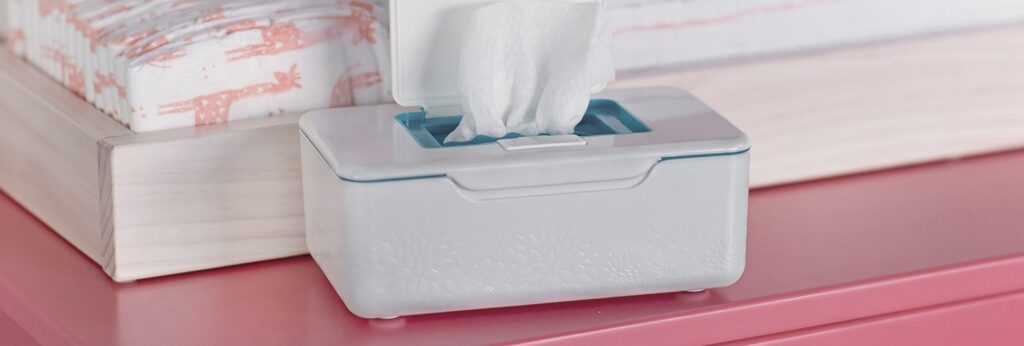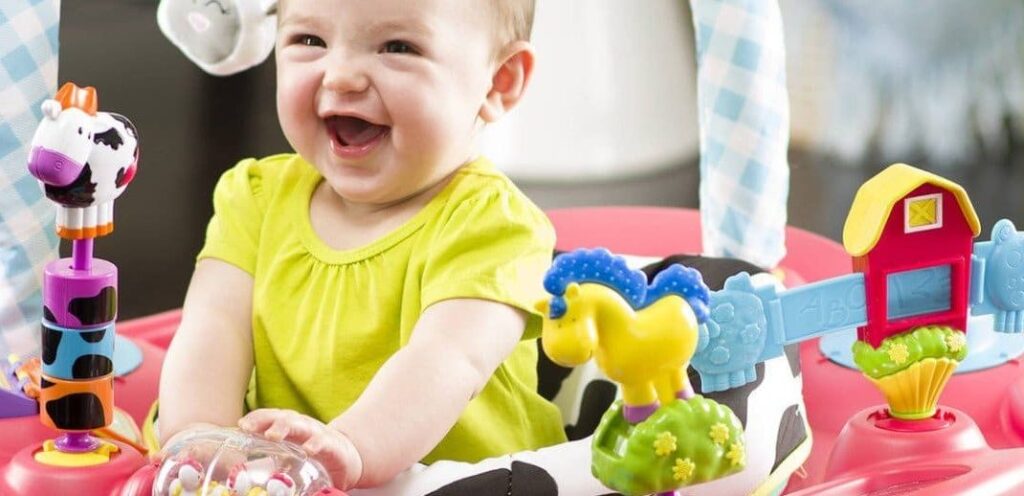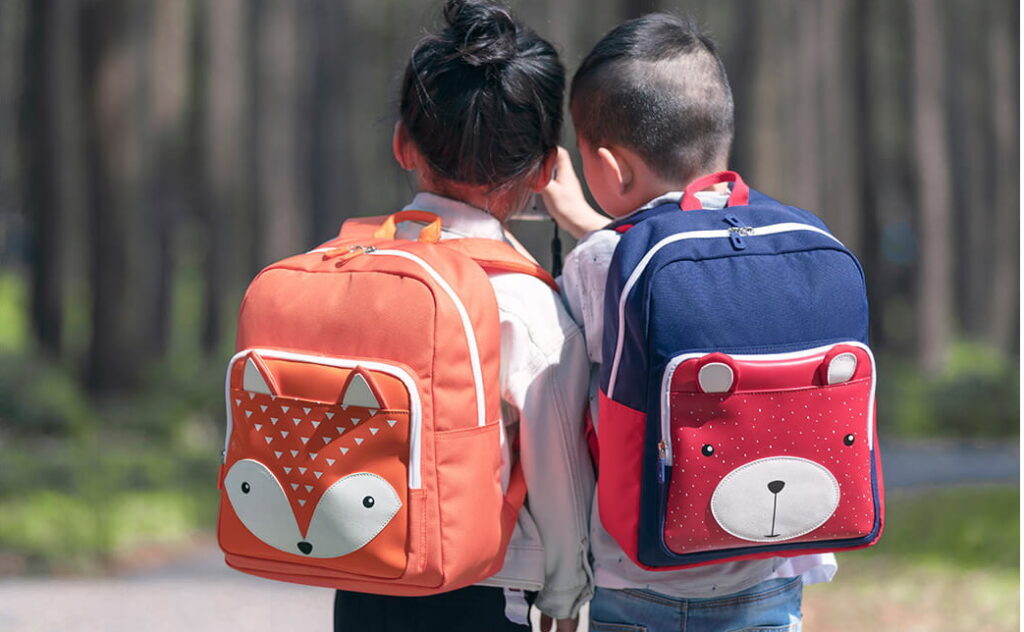First time parents have much to learn about their little one’s patterns and habits, especially sleep patterns. For instance, infants actually have a naturally irregular breathing pace and so its sometimes very hard to judge if holding their breath for seconds at a time is natural or of concern. Baby breathing monitors are a great way to judge what’s natural and what isn’t.
When shopping for the best baby breathing monitor, make sure you consider the range of a device. Usually, you will have around 200 feet before you lose reception and can’t check in on your baby. Also don’t forget about the sensitivity adjustment option, as it will help you to customize the alarm trigger level in accordance with your child unique behavior. We ended up with a list of top 8 picks, and the Sense-U Baby Breathing Monitor 3 deserved our Editor’s Choice nomination.
More features: requires 2.4GHz WiFi network, lights & sounds alert
The Sense-U Baby Breathing Monitor 3 is a 3-way tracking system that monitors the breathing, sleeping position, and temperatures of the baby during sleep. This system has a base unit that communicates with a smartphone app with an audible alarm if the breathing becomes weaker. The camera system monitors the sleeping position, babies should always sleep on their backs as rolling onto their stomachs can be dangerous. Maintaining a healthy body temperature during sleeping is also important, if the baby is too hot or cold this information will be relayed to the app.
Sense-U supports its baby monitoring products with firmware updates so it’s important to update to the latest version of the software after purchasing this product. This baby monitor requires a 2.4GHz WiFi network connection is required to operate. It’s important to understand that this system will not work on a 5G or Hotspot WiFi connection. The Breathing Monitor 3 package includes the Sense-U baby device, the new base station unit, a USB power cable, and the user manual. Sense-U has a 1-year warranty with this baby monitor and a full refund within 30-days is possible, if you’re not happy with this product.
More features: 2-way audio, room temperature/humidity alerts, HD 1080P crisp clear picture, cloud storage
The iBaby i2 Smart Baby Breathing Monitor is a WiFi smartphone baby monitoring system that can track the sleeping patterns of a baby with low, high, and no breathing feedback. Access to breathing analytics data comes at no extra price, there are no monthly fees and iBaby offers users a comprehensive 1-year manufacturer’s warranty on this product. This baby breathing monitor will tell the parent how long the baby sleeps, when they wake during the night, and if they are getting sufficient sleep. The readings are based on respirations per minute (RPMs) which are related to the iBaby App which can alert the parent if there is a problem.
The i2 video camera is a HD model which provides a crisp and clear image that can be zoomed in or out to get a full view of the baby. The camera works well in nighttime viewing mode and it’s possible to clearly see the face of the baby for extra peace of mind. There is even a built-in sound machine that has more than 1,000 lullaby tunes, white noise for sleeping, and other options. The controls offer complete privacy or they can be opened up to approved family members that want to check in on the baby. The app can give the parent valuable insights into how the baby sleeps which can be helpful when improvements to the sleeping experience are needed.
More features: night vision HD video, free app connected, contact-free, zoom capability, built-in speaker and microphone
This high-tech solution offers real time footage and monitoring of your baby with night vision HD video as well as fantastic day time surveillance. Top Pediatricians suggest this as one of the top products, this is especially to the device being IRB-approved and designed specifically for use in Children’s Hospitals.
It comes with a ‘SLEEP’ setting that notifies you – via phone application – when your baby falls asleep and breathing patterns change, as well as when your baby begins to wake and cries. From another room via a speaker built into the camera you can talk to your baby using the app and sooth them back to sleep or keep them happy while you walk upstairs.
This camera attaches right to a crib or shelf corner and adjusts for a bird’s eye view of your infant with the best picture being at approximately 3-feet away from the mattress. With this device you’ll finally get the rest you deserve instead of constantly watching over your baby.
More features: loud acoustic and visual alarm, battery operated, SIDS certified
This is rated as one of the best monitoring devices to reduce the risk of SIDS. In fact, its commonly used in hospitals as well as homes for placing under your baby to detect all motion rates including those subtle rises and falls of the chest.
However, this is specifically a device for a baby-bedroom near the parent’s bedroom or a crib right in the parent’s bedroom. It does not include an additional monitor for elsewhere in the house and instead provides warning alarms and visual lights directly from the crib. Device is entirely battery operated but has a long-lasting battery life which in no way decreases the brightness of the light alarms or sound of the acoustic ringing alarms.
Installation is simple and the sleeping pad can be inserted on top of the crib mattress, under the bedsheet, or even under the mattress itself. Next, the monitoring device attaches anywhere on the crib you want it with great hands-on controls that offer sensitivity settings and instant warnings.
More features: two sensor pads, sound activated LED indicators, 85dB alarm
One of our more cost-efficient professional choices, this baby monitor is quite simple and provides two sensor pads which fit under a baby mattress to pick up micro-movements and distribute information on breathing, motion, temperature, with available audio and even visual options.
Up to four cameras can be linked to this unit and mounted in the bedroom or crib which with the pads are all high-definition capable over a secure interference-free connection for stable streaming and crystal-clear vision with sound. Pads and machine are designed not to disturb your babies sleep and all components are chargeable.
Parent device include tabletop or wall mounting options and has a massive number of additional feature including Eco Mode Voice Activation, temperature alerts, camera zoom controllability, playable crib-side lullabies, and warnings which register as an alarm or vibration or pulsing light.
This device features an original patented design and is truly the first of its kind.
More features: movement-rate indicator lights, wearable
This unique monitoring device clips to your babies’ diaper and remains secure so long as their clothing stays in place, it’s also water-proofed against bed-wetting and slobber. On our list this is the best budget pick for your household and at its affordable price it includes fantastic extras which monitor your baby’s movement-rate and breathing.
Manual settings on the device allow you to set an audible warning for when breathing or movement stops for 15, 18, or 20 seconds. Audible register of the alarm is enough to reach through the wall into an adjacent room, however this is not the best device for babies sleeping on a different floor away from their parents.
Additionally, the clip-on sensor includes indicator alarm lights, a storage case, baby-safe clip on teeth, and very simple directions for use. For any cribs directly in a parent’s bedroom, this is our number one suggestion for parents. It’s simple, secure, very sensitive, and has a long-lasting battery life.
More features: heart rate and oxygen levels, lights, sounds and app notifications, 3 washable socks included, free cloud-connected app, BPA free, latex free, lead free
A one-of-a-kind tracking device and included application, the Owlet Smart Sock device monitors a baby’s heart rate and oxygen levels by using clinically-proven pulse oximetry technology.
Instant notifications reach your phone if your babies heart rate ever drops or rises below the regular tracked patterns of their breathing, and include loud alarms on your phone and the machine itself. How it works: the unit includes three washable socks which wrap over your babies’ foot and use a Bluetooth connection to relay data from crib to machine (up to 100 feet away).
For the best and most accurate results experts suggest you alternate between the left and right foot each night in case your baby receives better or worse blood pressure to either or both of their limbs. Additionally, these socks are guaranteed BPA free, pediatrician approved, water safe for nightly bed wettings, lead free, and latex free.
The included base charging station creates a soothing green nightlight and uses light, app, and sound notifications if anything concerning happens during the night.
More features: LCD touchscreen, adjustable sensitivity, out-of-range indicator, location feature, sound lights, low battery alert and much more, two-way audio
This more traditional baby monitor comes with two devices, one for the baby’s bedroom or crib and the other for your desk, bedside table, or kitchen counter; wherever you go without your baby, it can go. The baby unit provides a gentle glow in your baby’s bedroom and has manual sensitivity settings to measure motion in the crib with instant alerts after 20-second non-motion intervals.
Angelcare’s parent-unit includes smart features on an LCD touchscreen which allow you to control the motion detector sensitivity and track low-battery, breathing alerts, temperature of the room, and sounds in the room. If your baby is particularly loud or rambunctious, the speaker can be muted, although this will not mute notifications or alarms in case of breathing problems.
Two-way audio options are available so you can talk to your little one from anywhere in the house, additionally this machine has an insane range for large houses and can transfer from baby’s room to your hand at up to 820-feet. Setup is simple but does require batteries for both devices and doesn’t offer a charging function.
The remainder of our buying guide is provided to elaborate on the uses of baby breathing monitors and reasons why pediatricians insist you have one in your home. Additionally, we discuss product features and give examples of monitors which have the high-quality aspects you might be looking for. Frequently asked questions along with our top nominations are listed and discussed below; it’s our hope the remainder of this guide will greatly improve your ability to confidently purchase the best baby breathing monitor.
Not all pediatricians will suggest you get a monitor from the get go, typically this suggestion is only made when your toddler or infant indicates habits which aren’t normal or healthy; however, with children its often very hard to determine if a baby’s breathing pattern doesn’t fit the norm. Getting on just in case is often the best course of action, however you should certainly get one if your baby has had any apparent life-threatening event. These events include an absence of breathing, parent resuscitation of the child, or skin coloration which is blue or deep white. Typically, these events indicate a breathing disability (many of them a temporary part of your child’s development) or poor blood circulation. For premature babies these sleeping problems are much more common and parents of early born children would do best to invest in a monitoring device.
Aspects of a baby monitor which are well worth the investment include alerts which allow you to respond immediately when your baby is in danger, along with a slew of other useful extras. Vital sign monitoring devices track breathing and heart rate, audio functions let you listen in on your child, video monitors let you see everything whenever you’re nervous about your sleeping baby, and many of these devices are easy to use with great portability functions.
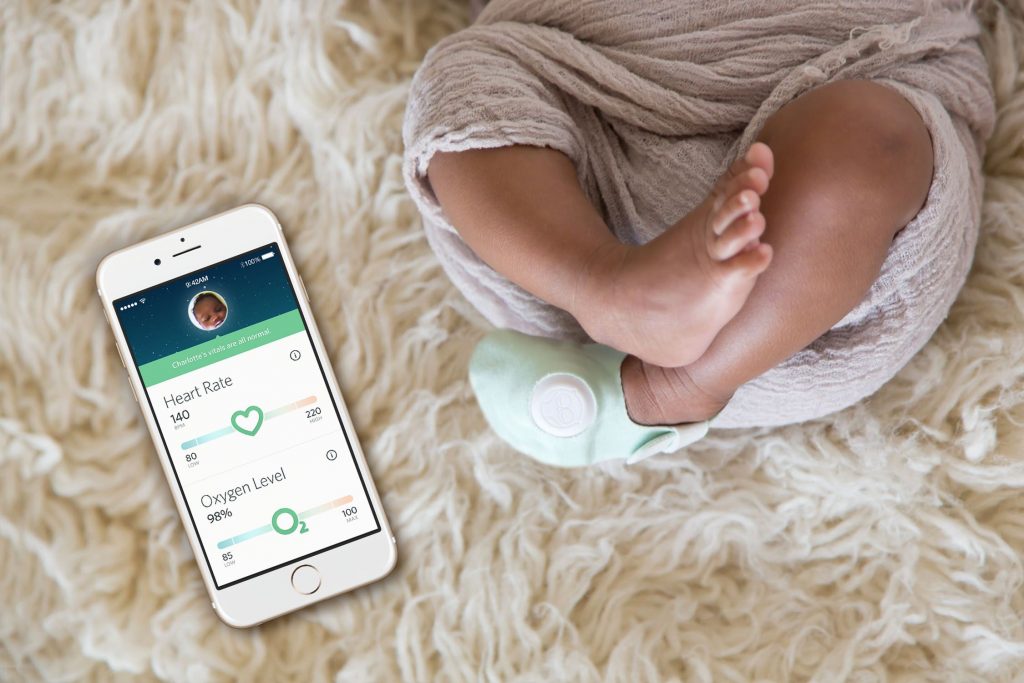
Movement monitors, for instance, are one class which are designed specifically to detect motion, or rather the absence of it. These monitors often include wide-range sensors, wearable products for your baby, or motion pads which tuck under your infant or under the bed. The range of motion that movement monitors can sense is often adjustable per device, but typically these monitors can sense up to the shallowest breaths and rise/fall of your babies’ chest. Sometimes you might hear these referred to as ‘Mat monitors’ (mattress monitors).
Heart and breath monitors register chest movement and can even register the electrical activity of your infant’s entire system – though these devices require highly expensive electrode dots to be attached to your infant’s chest. One reason you’d get something like a heart monitor, rather than a motion monitor, is that your infant is rambunctious and disrupts or removes motion sensors attached to them or attached to their crib. The perks of heart and breath monitors include an alarm which can be set to ring when an infant’s heart rate rises or falls dangerously, and additionally these typically include rechargeable batteries.
Oximeters are a third class of baby monitor. These devices are rarely used in-home and more frequently seen in hospitals. They are perhaps the most sensitive type of monitor and alarm is there is a prolonged pause in breathing due to sleep apnea or irregular airflow between two breaths (typically 20-second apart). Additionally, these devices detect and report a percentage of oxygen intake.
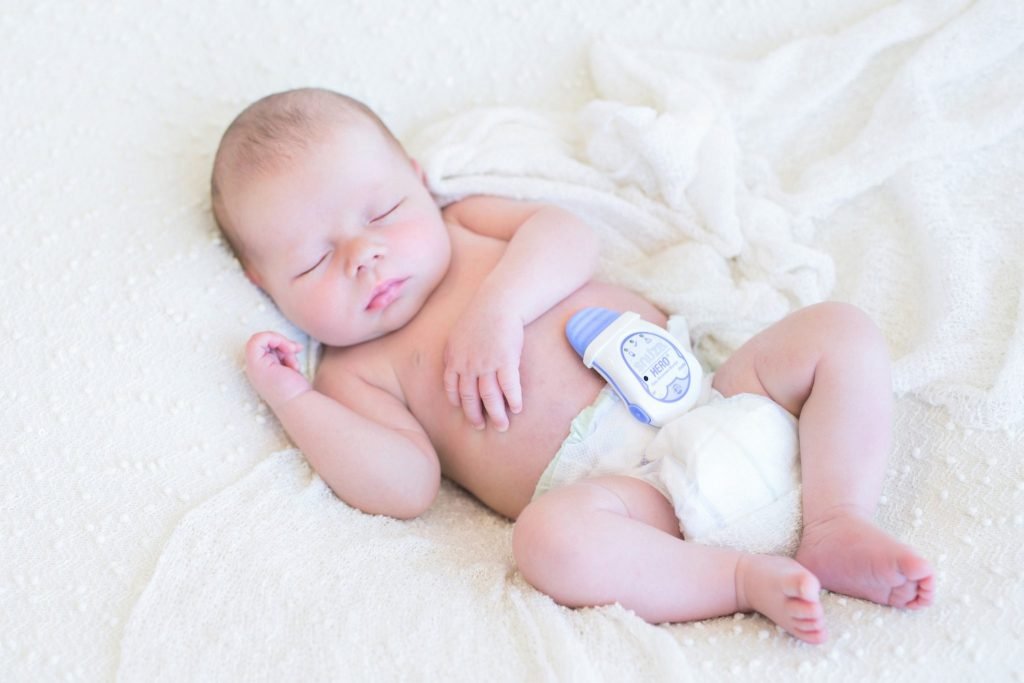
However, typically you can be comforted by the fact that babies take 30-60 breaths per minute. While sleeping this can slow down to 20 breaths per minute. At around 6 months their sleeping breath rate might rise to 25 or even 40 breaths per minute. Behaviors which break this pattern are certainly worth discussing with your pediatrician, and a baby monitor is always worth the added expense in your budget.
One rule of thumb: always reach out to your doctor. If you have any concern related to your baby and how they sleep or breath, your doctor will be able to inform you in the behavior is regular or not. If they can’t tell what the problem is there are always test that can be done and light suggestions which can be made to ensure the health of your little baby. For irregular breathing specifically, on your own you should check your babies’ pulse and make sure they are in distress or not. If a baby can’t breathe, they will let you know – perhaps not audibly, but with their actions and their eyes.
To best help your doctor identify a problem and best understand how your baby operates, first learn the typical patterns of your baby when they’re awake and when they’re asleep. You might consider taking a video or even lightly taking their blood pressure with the approved tools specifically for children – your doctor can either do this or direct you to the proper equipment for it. Finally, always have your baby sleep on their back, this is the best course of immediate action you can take as a parent. On their back your baby has a decreased risk of SIDS, will better avoid respiratory infection, will have clearer congestion, and will even sleep better.
You’ll notice that many of the following features were previously mentioned in our individual product reviews. In this section we talk about each feature as it relates to the product in hopes this makes the purchasing process easier for you at every step of the way.
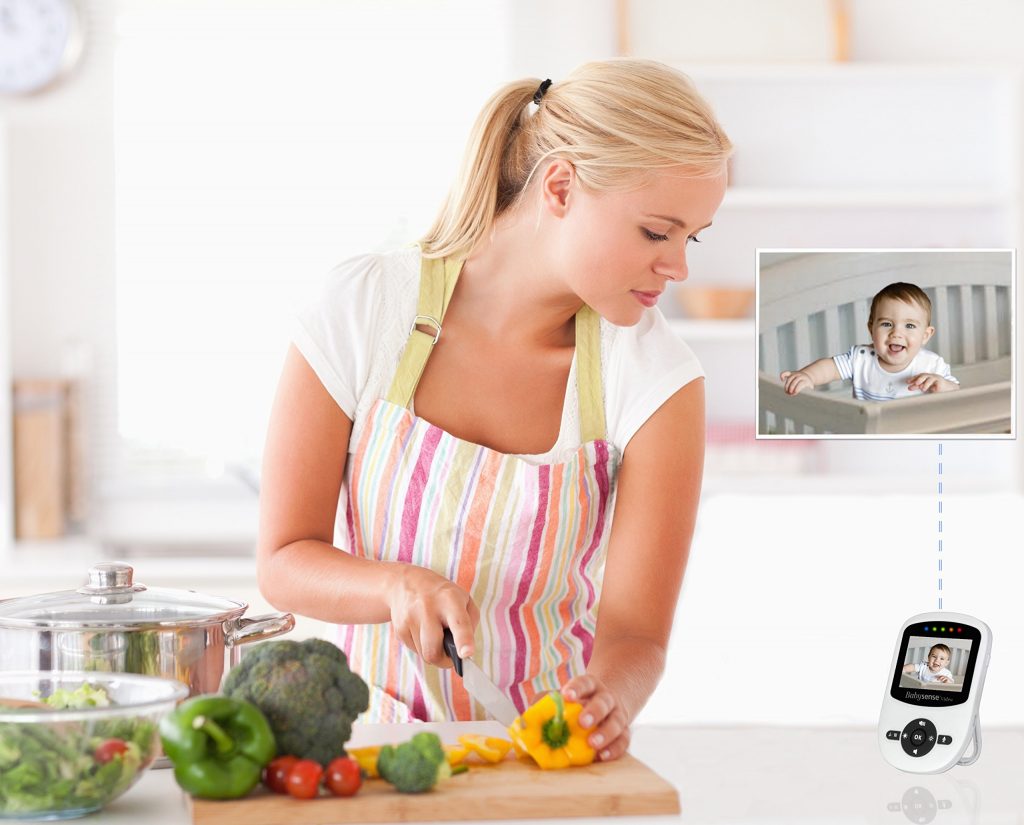 Size
SizeTypically size only matters with baby monitors that include pads to be inserted under your baby or under a mattress. Consider the NANNY Baby Movement European Monitor and Babysense 7, both of these products include pads which will detect and report your baby’s movement and breathing during sleep and at all other times while in a crib. Certain cribs or thick mattresses may not be compatible with the size of these sensor pads.
One of our monitors with the best range is the Angelcare AC701 with an extended range of up to 820 feet. A baby monitors range indicates how far a transmitter can be from a receiver, or put more simply how far you can be with your monitoring device from your babies’ crib. Video surveillance systems and audio systems typically have a range of several hundred feet before you lose reception and can’t check in on your baby. Make sure you keep this in mind!
Although some baby monitors come with a plug-in charging cord, certain products are made to attach to your baby, slip under the baby’s bed, or sit elsewhere in a room or crib. Typically, these separate devices run on battery power which allows them to be portable. However, many of these low-end products will also have the low battery life and even non-rechargeable batteries. If you’re considering buying a video receiving device, know that these monitors probably use up the most battery power the quickest.
The monitors which allow you to adjust the sensitivity of your transmitting part are well worth the extra investment or added research. Some babies are naturally stiller than others, so for these infants you’re going to want to set the alarm settings to detect at a lower level (longer breath interval) than other products. Otherwise you’re going to have monitor alarms going off every time your baby takes a nap and that can quickly get frustrating. Some great products with adjustable sensitivity levels are the Owlet Smart Sock, Angelcare AC701, and NANNY Baby Movement European Monitor.
Alarm functions should be loud and a little bit annoying, after all if a product doesn’t immediately get your attention and warn you of a problem than it’s not worth the money. Alarm functions include loud tones and even flashing lights and these functions can register on separate parent devices or just on devices in the baby bedroom or attached to the crib.
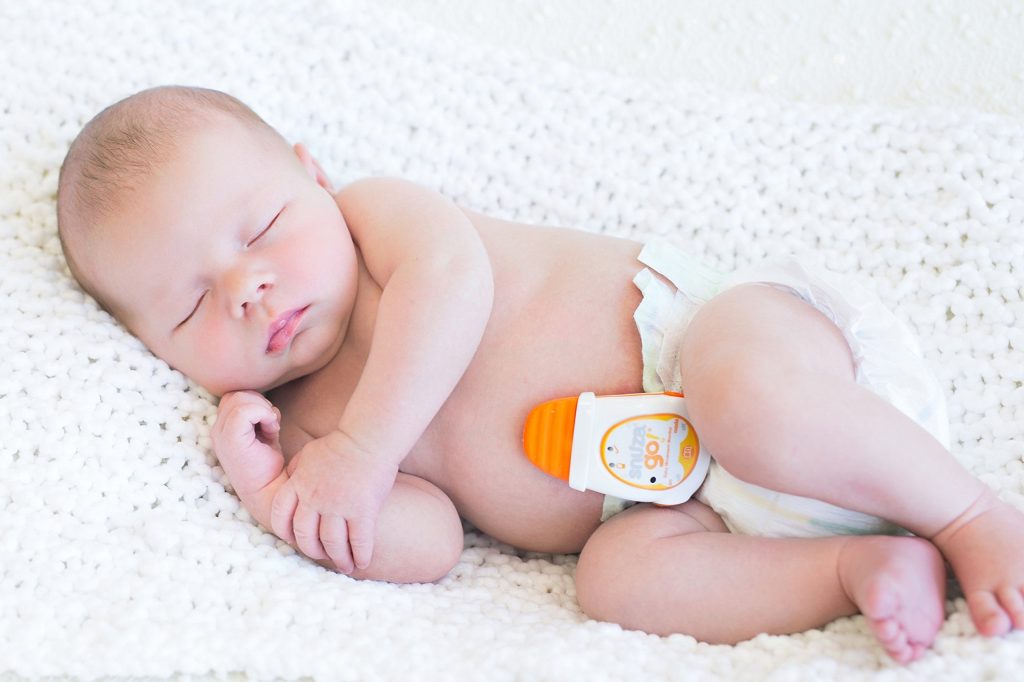
If you’re picking a product which attaches to your child or fits under them or under the mattress, don’t pick something made of shoddy materials. If your baby tends to throw things, perhaps don’t pick a clip-on monitor as these have a lower durability. Most mattress pad monitors are designed to be highly durable and difficult for your baby to move or damage, so these are great options. However, the best option for durability are those devices which just sit in the room and monitor motion, breathing, and sound from afar. The Cocoon Cam Plus is a monitor highly rated by pediatricians and parents alike.
Indicators will indicate low battery or improper working/broken sensors. Typically, these indications are a low beeping sound or flashing warning lights.
Two-way audio is a must for those parents who want to be there to comfort their crying babies without having to step into a room and disrupt their sleep. These products include a receiver and transmitter so you can hear your baby and they can hear you. Such products on our list include the Cocoon Cam Plus, Angelcare AC701 and Babysense 7 which is two-way connection capable.
For your safety purchasing and testing a product which works best for your home and child, choose the products with the longest available warranty. These products will give you enough time to test all the features of the product to ensure everything works the way it should and monitors those vital functions which have been concerning you.
Last but not least, we leave you with our top three highly-rated products. In our opinion and also based off our research, these are easily the best baby breathing monitors. We hope listing them hear will further simplify your buying process when caught between multiple different options and opinions.
Sense-U Baby Breathing Monitor 3. Our favorite thing about this product is that it gives you a direct look at everything going on with your baby in every stage of their sleep process. It includes technologically advance socks which fit over an infant’s foot to detect blood pressure, breathing rate, motion, temperature, and so much more.
The iBaby i2 Smart Baby Breathing Monitor is a great product that provides breathing analytics data for your baby with no monthly fees or other costs. The monitor will let you know if your baby is getting sufficient sleep and if they wake in the night, while the HD camera provides crisp, clear images.
Cocoon Cam Plus. This device has the longest wireless range and lets you check on your baby even while you’re at work and they’re with the Nanny. Monitor comes with two-way audio connections and HD quality video with night-vision after all the lights are out.

